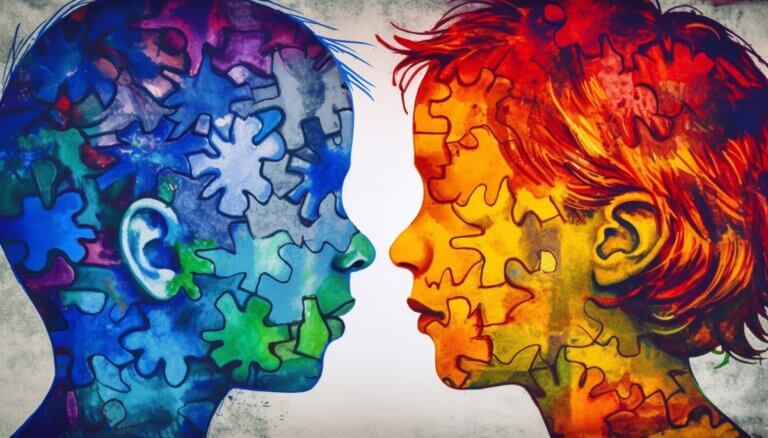Table of Contents
Understanding and Managing One’s Own Emotions

Self-perception and emotional awareness
In the world of Emotional Intelligence and Social Skills, the ability to recognize and understand one’s own feelings plays a key role. This process, known as self-awareness, forms the foundation for Emotional Social Competence and is crucial for managing both personal and professional challenges. The more consciously we perceive our emotional states, the better we can control them and act in accordance with our goals and values.
The Power of Self-Awareness
Imagine Anna, an executive who regularly leads board meetings. Until now, she unconsciously experienced stress and tension before each meeting, which manifested in harsh communication and an authoritarian leadership style. By understanding her emotional patterns, Anna realized that her moods not only influenced her decisions but also affected the atmosphere within the entire team. With this knowledge, she made efforts to improve her Interpersonal Skills and developed strategies to manage her emotions more productively, leading to more harmonious and effective sessions.
- By learning to identify our emotions, we can transform obstacles into opportunities.
- Precise self-awareness allows us to anticipate stress and react constructively.
- Conscious emotional awareness promotes empathetic leadership and strengthens Social Emotional Intelligence in the team.
Practical Application of Emotional Self-Awareness
Another example is Max, a software developer who often reacted with frustration when his ideas were not immediately embraced during project discussions. By training his emotional self-awareness, Max learned to recognize and articulate his disappointment. This new ability helped him deal more constructively with feedback and collaborate with colleagues on solutions.
Incorporating Emotional Intelligence in Social Interaction into professional development programs shows that employees like Max not only benefit individually but also positively influence the social dynamics in organizations. Companies that invest in their employees’ emotional intelligence report increased job satisfaction and better team performance.
Self-awareness as part of Emotional Intelligence is thus a crucial tool that enables us to communicate more efficiently, respond more empathetically, and ultimately be more successful in our daily lives. By continuously dedicating ourselves to this skill, we can improve our relationships and develop a deeper understanding of ourselves and our fellow human beings.
Emotional Self-Regulation and Stress Resilience
Emotional intelligence and social skills form the foundation of a balanced life and a successful career. They enable us to understand our feelings, manage them, and effectively put them into action – whether in conflict situations, when leading a team, or in private life. Especially emotional self-regulation and stress resilience are key components that have a significant impact on our psychological well-being and our interpersonal relationships.
Emotional Self-Regulation in the Workplace
Imagine you are about to give a crucial presentation, and suddenly doubts flood your mind. Your heart races, your hands sweat – a classic case of stage fright. People with high emotional self-regulation recognize these symptoms immediately as a natural stress response and can manage their emotions and maintain their performance using techniques such as deep breathing or positive thinking.
- A marketing manager uses mindfulness training to maintain inner calm and master critical negotiations.
- A teacher applies cognitive restructuring to not take frustrating lessons personally and to respond professionally.
- A surgeon employs visualization techniques to achieve calmness and focus before complex surgeries.
Such examples illustrate how valuable emotional self-control is. It is a sign of social emotional intelligence that allows us to think and act clearly in stressful situations.
Building Stress Resilience
Resilience is the ability to quickly recover from setbacks and emerge stronger from difficult situations. Emotional social competence supports resilience by enabling us to consciously control our reactions to stressors. Studies show that resilient individuals often have a positive outlook on life and actively seek and utilize social support.
- An entrepreneur who quickly develops new strategies after a project failure demonstrates high resilience.
- An executive who remains composed under heavy workloads and inspires her team uses emotional intelligence in social interactions.
- An athlete who does not give up after an injury but adjusts his goals and continues to fight shows emotional self-regulation.
These scenarios highlight the significance of emotional intelligence and stress resilience in various areas of life. By training these skills, not only can individual performance be enhanced, but overall quality of life can also be improved.
Emotional self-regulation and stress resilience are not just desirable attributes but essential parts of a mature personality and leadership quality. The key is to strengthen one’s emotional intelligence and social skills through continuous practice and reflection. Not only in challenging professional situations but across the spectrum of our social lives, they provide the tools to act with serenity and clarity.
Empathy and Relationships in a Social Context

Empathy and Its Influence on Communication
Emotional intelligence and social skills are often inextricably linked and find their expression in the core concept of empathy. Empathy is the ability to recognize, understand, and appropriately respond to the emotions of others. It is a fundamental building block of successful interpersonal skills and essential for effective communication.
The Importance of Empathy in a Professional Context
Empathy is not only vital in personal relationships but particularly critical in professional life. Social emotional intelligence makes it easier for us to deal with the emotions of colleagues, clients, and leaders. Consider a manager who takes the concerns of his team seriously and responds to them. This sensitivity can noticeably improve the working atmosphere and lead to higher employee satisfaction and productivity. In contrast, a senior employee who ignores the emotional needs of his staff often leads to conflicts and high turnover.
- An empathetic project manager, for example, notices signs of stress in a team member and offers support before performance suffers.
- A salesperson uses empathy to build a relationship with customers based on trust and understanding, which ultimately strengthens customer loyalty.
- A customer service employee who can put themselves in the customer’s shoes is likely to respond more effectively to complaints and offer a solution that contributes to customer satisfaction.
Emotional Intelligence in Social Interactions
Empathy not only promotes harmony in the workplace but also directly affects the effectiveness of communication. Through empathy, we are able to lead conversations not just on a factual level but also on an emotional level. This enables us to clarify misunderstandings and address the actual needs of our conversational partners.
Studies show that teams which practice social emotional competency are more willing to collaborate. A study in the Journal of Applied Psychology illustrates that empathetic leaders are better at resolving conflicts and creating an inclusive work environment.
However, implementing emotionally intelligent communication can pose challenges. It is important that empathy is not interpreted as a weakness, but as a strategic tool to strengthen relationships and ensure effective communication. As an empathetic communicator, it is also crucial to maintain a balance between closeness and professionalism to provide support while respecting boundaries.
Emotional intelligence and social skills, especially the ability to communicate with empathy, are thus critical success factors in a connected and dynamic work environment. They form the core of a culture based on trust, cooperation, and shared goals.
Social Skills and Team Dynamics
Emotional intelligence and social skills are the invisible forces that often determine success or failure in team and group work. Imagine a project team under high pressure to meet a deadline. The emotional intelligence of a team leader enables them to recognize this tense situation and act appropriately. Instead of fueling pressure and frustration, they can use their emotional social competence to ensure balance and motivation.
Interpersonal Competencies in Practice
A true story from everyday business life illustrates the significance of interpersonal competencies. A project manager notices that an otherwise high-performing employee is losing productivity. Instead of confronting the employee directly, he uses his skills in emotional intelligence in social interactions to have a private conversation in a trusting atmosphere. Through active listening, the manager learns about personal challenges burdening the employee. Together, they find solutions that allow the employee to manage his situation while continuing to perform his tasks effectively.
- Conflict resolution: Emotional intelligence helps to identify tensions early and address them proactively.
- Leadership skills: Through empathy and understanding of motivators, leaders can inspire and guide teams.
- Cooperation: A team that communicates with emotional intelligence fosters a culture of support and trust.
Emotional Intelligence as a Success Factor
The ability to apply emotional intelligence in a team context is a crucial factor for the overall success of projects. For example, an IT development team that is under a tight schedule to develop new software must harmonize both technically and interpersonally. The social emotional intelligence of the team leader makes it easier to manage stress, avoid conflicts, and thereby boost productivity. When every team member feels understood and valued, it not only maximizes individual performance but also strengthens internal team cohesion.
Through effective application of emotional intelligence and social skills, a group can not only fulfill the assigned tasks but also develop innovative and creative solutions that go beyond the expected. A team operating on the basis of emotional intelligence is more flexible in dealing with changes and more resilient in the face of setbacks.
Overall, it is evident that Emotional Social Competence is much more than just a ‘nice’ additional attribute – it is an essential component of successful teamwork and should not be underestimated in any modern work environment.
Summary
Emotional intelligence and social skills are key components of success – both in personal life and in the professional environment. They enable us to understand our own emotions and respond appropriately to the emotions of others. By learning interpersonal skills and emotional intelligence in social interactions, we can sustainably improve our well-being and our interactions with others.
The Importance of Emotional Intelligence and Social Competence
To illustrate the importance of emotional intelligence in social dealings, the example of a leader named Anna can be used. Her ability for self-awareness helped her analyze her initially problematic communication and bring about positive changes. She learned to reflect on her feelings and, based on these reflections, to improve her interpersonal skills, which directly affected the team dynamics and the effectiveness of meetings.
- With emotional self-awareness, emotional challenges can be better recognized and addressed.
- A conscious emotional awareness is essential for empathetic leadership and strengthens social emotional intelligence across the entire team.
- Companies that invest in emotional social competence report increased satisfaction and improved team performance.
Practice shows that emotional self-regulation not only supports us in everyday work but is also crucial for building stress resistance and resilience. People with high emotional intelligence might use mindfulness training or cognitive restructuring to better cope with challenges and manage their reactions to stressors.
Emotional intelligence and social skills are also crucial for successful social interactions. A manager who understands the emotional needs of his team promotes a positive work climate, while ignoring these needs can lead to conflicts and dissatisfaction. Empathetic communication helps to minimize conflicts, promote collaboration, and build a strong team dynamic. An empathetic project manager, for example, can recognize early signs of stress among employees and respond accordingly before work performance suffers.
Emotional intelligence and social skills are ultimately the invisible forces in teamwork. They help a team leader maintain balance and inspire motivation in stressful situations. Effective management of emotional intelligence in groups not only contributes to better work performance but also fosters creativity and innovation.
Overall, the article reinforces the necessity to cultivate emotional social competence in all areas of life. Through practical examples and references to scientific research, it conveys how crucial emotional intelligence and social skills are for our mental well-being and our success.
FAQ – Emotional Intelligence and Social Skills
How can emotional intelligence help to resolve conflicts in the workplace more effectively?
Emotional intelligence allows us to accurately read the emotions of others in conflict situations at work and to respond empathetically, leading to more constructive communication. By managing our own feelings and expressing them appropriately, we can reduce misunderstandings and create an atmosphere of mutual respect. Thus, emotionally intelligent individuals often manage to find solutions that are acceptable to all parties involved and improve the working atmosphere in the long term.
How can emotional intelligence improve conflict resolution in social relationships?
Emotional intelligence significantly contributes to conflict resolution by enabling us to perceive and understand both our own emotions and those of the other party. This understanding allows us to respond empathetically, reduce tensions, and collaboratively work towards constructive solutions. High emotional intelligence also aids in considering the other person’s perspective, thereby creating a deeper connection and promoting more harmonious relationships in the long term.
How can high emotional intelligence contribute to improved conflict resolution skills in social interactions?
High emotional intelligence contributes to enhanced conflict resolution skills, as it enables individuals to understand and manage emotions in themselves and others. This leads to a more empathetic and effective communication style, reducing misunderstandings and promoting constructive engagement with differences of opinion. Individuals with high emotional intelligence are often capable of detecting and defusing tensions before they escalate, resulting in more harmonious and productive social interactions.




